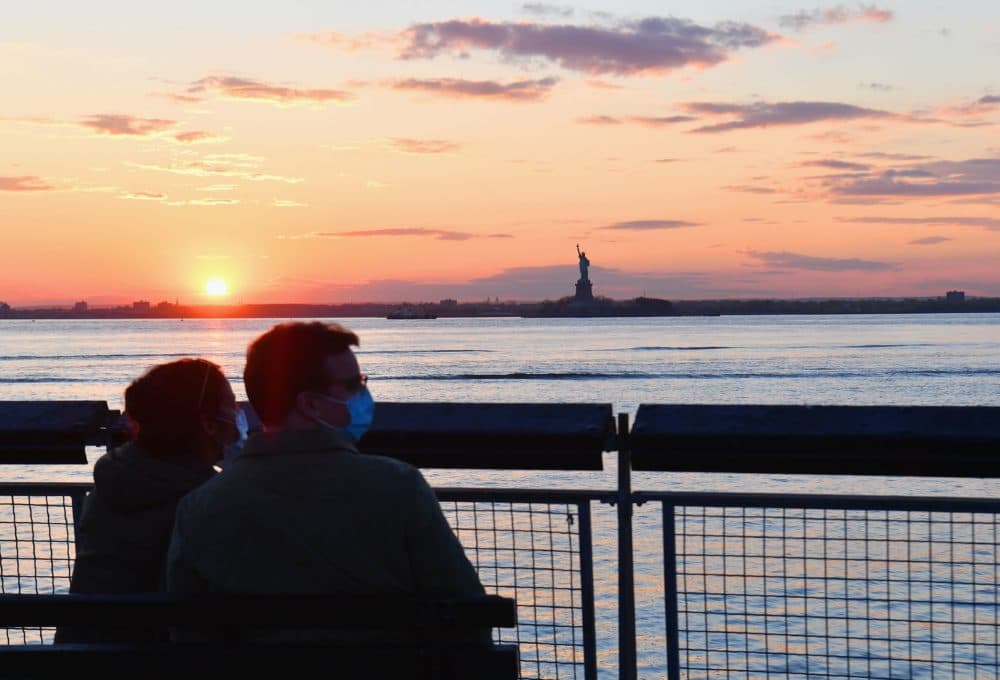Advertisement
Coronavirus In 2021 And Beyond: When Will Life Return To Normal?

Pandemics and plagues have always been a part of human life and have an impact on the way we live.
Nicholas Christakis, physician and sterling professor of social and natural science at Yale University, says the coronavirus pandemic will continue to affect our lives through 2021 and beyond. He details how in his new book, “Apollo's Arrow: The Profound and Enduring Impact of Coronavirus on the Way We Live.”
Pandemics are not new to the human species — “they're just new to us,” he says. And fortunately, we’re better equipped to handle the problem, he says.
“We are not the first people alive to face this ancient threat, but we are the first generation ever to face it at a time when we can manufacture a specific countermeasure like a vaccine in real time,” he says. “So it's a miracle, truly unprecedented, that we accomplished this.”
However, Christakis says the vaccine doesn’t herald a full stop to the pandemic just yet. Herd immunity — “the claim that a population of people can be immune to a condition, even if not every individual within that population is immune” — needs to be reached for us to get back to normal, he says.
When the virus is surrounded by people who are vaccinated, it has nowhere to go and thus outbreaks are suppressed, he says.
The threshold for herd immunity is indicative of how quickly the virus can spread. Measles, for example, is highly infectious and requires a high percentage of herd immunity, he says. But for the seasonal flu, Christakis says only 30% of the population may need to be vaccinated.
There are varying estimates for what percentage of the population will need to be vaccinated for COVID-19. He predicts a minimum of 50% of the population will need the vaccine before herd immunity can be reached.
That’s not an easy feat, he says, because of the sheer amount of people who will need the vaccine, which comes in two doses, and the fact people will likely need to be convinced to accept the vaccination.
“I think all of that's going to take at least nine months, maybe a year. We’ll reach the end of 2021, it'll be the beginning of 2022, before we reach this herd immunity threshold due to vaccination,” he says. “But the irony is, meanwhile, while we're doing all that, the virus is still spreading.”
Advertisement
That means herd immunity may be reached through vaccination or the natural spread of the coronavirus, he explains.
A lot has changed in 2020 — from eating at restaurants and traveling by plane to just hugging a loved one. New routines for health safety have transformed our daily lives. Until herd immunity is reached, mask wearing and social distancing will remain in the short term, Christakis says.
“This immediate period, we're going to still be, let's say, under the epidemiological thumb of the virus until we reach this important herd immunity threshold,” he says.
That doesn’t take into account how we bounce back psychologically, socially and economically in the long term.
“We have millions of children who have missed school. We have tens of millions of Americans out of work. We have millions of businesses that have permanently closed. We have borrowed tons of money. We have rejiggered our lives,” he says. “And to unwind a lot of those things and cope with them will take time.”
He calls that time frame the “intermediate” pandemic period, and by analyzing past plagues, he predicts it will take a year or two for recovery.
Then at the end of 2023 and the beginning of 2024, we enter the “post-pandemic period” where something similar to the roaring ‘20s will likely occur, he says.
Reckoning with grief and loss will take time, too. Pandemic-induced sadness has been described in the Bible, Shakespeare and Homer’s “Iliad,” he says, which signals how emotions such as sorrow are part of the complicated human experience.
“And as such,” he says, pandemics “elicit very deep and fundamental human sentiments like grief, like fear, like denial, but also hope and optimism and love and other good feelings, too.”
In his book, “Apollo's Arrow,” Christakis writes how some plagues have lasted for a significant amount of time. Take the Bubonic plague, which went on for 1,400 years, according to his book.
As deadly as the coronavirus pandemic is, Christakis says it’s still not as lethal as other historic outbreaks.
Denial and lies are “timeless” in pandemics, he says. A contingent of people throughout history has perceived epidemics as a hoax or conspiracy of some kind.
“Denial is a very primitive and fundamental human defense. And lying about it has been seen from time immemorial,” he says.
Taking a cue from past public health crises, the government has been preparing for potential future respiratory pandemics. And that’s partly why Christakis says he feels “disappointed” by how the U.S. has done the past year. With an open democracy, top-notch scientists and experts, reliable media sources in the modern day, he hoped to witness “less superstition” about the coronavirus. Plus, he adds, there’s no guarantee another serious pandemic isn’t on the horizon.
Christakis’ outlook isn’t entirely grim, though. The virus has exploited “very deep and fundamental aspects of our common humanity,” he says, but also “takes advantage of our ignorance” — something that can be overcome by refuting misinformation through knowledge, facts and ideas.
“We're going to beat this virus,” he says, “precisely by working together, precisely by sharing information, precisely by recognizing we all have a shared interest in what happens to all of us.”
Julia Corcoran produced and edited this interview for broadcast with Todd Mundt. Serena McMahon adapted it for the web.
Book Excerpt: 'Apollo's Arrow'
By Nicholas Christakis
Excerpted from APOLLO’S ARROW. Copyright © 2020 by Nicholas A. Christakis, MD, PhD. Used with permission of Little, Brown Spark, an imprint of Little, Brown and Company. New York, NY. All rights reserved.
This segment aired on December 23, 2020.

